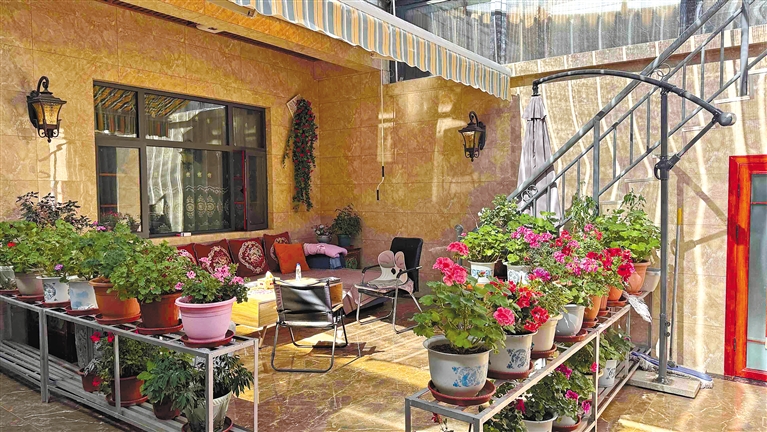Source:xzxw.com 2025-07-15

A corner of Chimed's courtyard.
At 8 a.m., sunlight filters through the trees at Lhasa's Dzongyab Lukhang Park, casting dappled shadows. 53-year-old Chimed stretches her arms to the music, dancing a lively Guozhuang with her sisters. Soon, beads of sweat form on her forehead, but her smile never fades.
"Who could've imagined such leisure in the past?" After dancing, Chimed sits on a park bench, cradling a thermos, and begins to unravel the changes woven into her life over the decades.
"Have you ever seen a leaky adobe house? When it rained outside, it rained inside too—we'd scramble to catch the drips with pots and pans." Her fingers trace the patterns on her thermos as her gaze drifts into the distance, as if transported back 20 years.
Back then, Chimed's family of six lived in a mud-brick house with walls of packed earth and a roof of sparse thatch. At dawn, she and her husband would head to the fields to plant potatoes, harvest turnips, and tend to barley. After months of toil, any surplus crops were hauled to a market miles away on the back of a bicycle. "The sacks were so heavy, and the bumpy dirt roads jolted our bones. A good day's earnings might be 20 yuan—if we were lucky."
The turning point came in May 2003. Chimed recalls the day village officials announced: "The government is acquiring land to build a school—and new homes for us!" Skeptical at first, her doubts vanished when they toured the newly built resettlement community. The spacious, sunlit apartments with tidy interiors left everyone awestruck. "We couldn't wait to move in."
In December 2008, Chimed's family relocated to Tama Community's resettlement community. "The first time I stepped inside, touching those white walls, I cried." She remembers every detail: gleaming aluminum windows, anti-slip tiles in the bathroom. "Everything was there—a market downstairs, a park nearby. Such a life was beyond our wildest dreams."
As urban development surged, job opportunities followed. The community matched residents with roles based on their circumstances. Chimed's husband, Purbu, became a driver for a local unit, earning a steady income."I took odd jobs, pulling in thousands a month—far better than farming!" Chimed recounts. Later, their children grew up and secured stable jobs too. "Now we just focus on enjoying our golden years."
The progress continued. Recently, community leaders launched collective businesses, converting street-facing apartments into rental shops. What began as a few grocery stores blossomed into restaurants, clothing boutiques, and phone retailers. "Last year's dividends guaranteed even the smallest households 60,000 yuan(RMB)!" Chimed says. "Now, elders get pensions, medical bills are reimbursed, and benefits abound."
Her phone holds hundreds of photos: a family portrait on the Potala Palace Square, snapshots from a trip to Xining. "We'd never seen such places before!" Flipping through them, she adds, "Now we can travel whenever we want."
Her words mirror societal shifts. Thirty years ago, bicycles were the only transport; reaching downtown took hours. Today, buses stop at the community gate, family members drive to work, and flights to Chengdu or Xi'an take mere hours. "Soon, my son's taking us to Chengdu—to explore Kuanzhai Alley and feast on hotpot." Her voice brims with anticipation.
As Chimed heads home to cook lunch, her modern kitchen hums: a double-door fridge stocked with fresh produce, a smart rice cooker blinking, a range hood whirring. Watching beef and peppers sizzle in the wok, she smiles. Those leaky nights and bone-rattling roads are distant memories. Now, her life steams ahead—toward even brighter horizons.
Reporters: Droma Chelin, Zhang Yu
Translator: Liu Fang
Review: Purbu Tsering, Drakpa Wangchen
Copyright © Xizang Daily & China Xizang News All rights reserved
Reproduction in whole or in part without permissions prohibited
Index Code: 藏 ICP 备 05000021 号
Producer: Xizang Daily International Communication Center